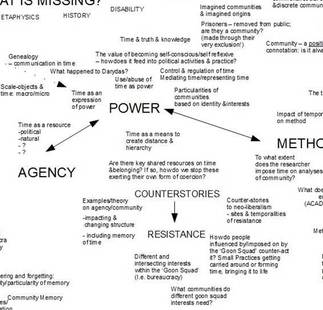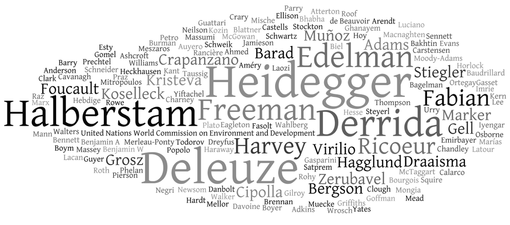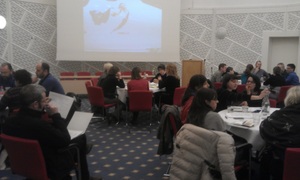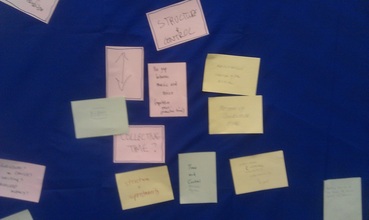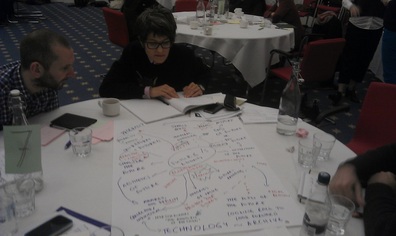Power, Time and Agency: Exploring the role of critical temporalities
17-18 January, University of Manchester
Organised by Michelle Bastian
|
Power, Time and Agency was the final event funded by our AHRC Temporal Belongings follow-on grant (AH/J006653/1) and was modelled on our first two-day collaborative workshop in 2011. Its topic was inspired in part by the discussions held at that event, but also by some of the issues that arose in our scoping study. A key problem that suggested itself for further exploration was the role of power and agency in responding to dominant modes of time. What resources were available for communities to transform the temporal infrastructures that supported their exclusion? How far might these counter-stories travel? What kinds of push-back is experienced by those trying to shift dominant conceptions of time? And further, how might different understandings of time affect how one experiences or conceptualises agency itself? (To read more about the conceptual background for the workshop you read the original call for participants here [pdf].)
In keeping with our network's aim to not just talk about time, but to actively experiment with it, we utilised many of the collaborative techniques we had used previously but also tried out more traditional formats, such as parallel sessions. |
All of our events are very interdisciplinary and also require varied modes of participation that not everyone may be used to, so we try to spend time at the beginning of each event getting to know each other a little bit better and also talking about what kinds of expectations we have for the workshop. To help spark some initial conversations I proposed the following working definition of 'critical temporalities' in order to help give us a reference point that we could develop over the two days:
A critical temporality is a time that is imagined, theorised or lived in order to make a better world.
Questions about this definition came up throughout the event, particularly in our final session of the first day where we began to map out some of the themes arising (scroll down for more info on our affinity mapping session). There was lots of debate about the use of 'better world', in particular, and so I ended up mentioning that I had been trying to make an ironic (though very oblique) reference to slogans used in Firefly and the Aliens franchise, where evil multi-planet corporations often say they are making or building better worlds. Sci-fi geekiness aside, the consensus was that more development on a definition was needed if we were to capture the complexity of the issues we wanted to raise.
|
Alongside these discussions we, of course, benefited from a wide range of inputs given by our presenters. This included keynotes by Lisa Adkins and Jane Elliott, four plenary sessions and two lightning talk sessions. It was particularly interesting to see the emergent themes that arose from the individually submitted papers. These included clusters around power/institutions/agency, perspectives on the time of modernity and development, the time of life and interdisciplinary perspectives on agency. Links to individual presentations are available below.
|
We continued our experiments with open space in our final session of the workshop. Here attendees nominated their own issues for further exploration and attended one or more of these groups depending on where there interests lay. I participated in the session exploring 'what is time' and was pleasantly surprised once again by the ability of this relatively simple method to connect people up with others who share their interests and concerns. You can find out more about this session below.
Before ending we had some time to reflect on the workshop as a whole and to evaluate the methods we had been using. I received lots of valuable feedback, including requests for even more time to discuss content with other attendees. We'll be incorporating this into our future events. Thanks to everyone who came along, and to the AHRC for supporting the event.
Michelle Bastian
Before ending we had some time to reflect on the workshop as a whole and to evaluate the methods we had been using. I received lots of valuable feedback, including requests for even more time to discuss content with other attendees. We'll be incorporating this into our future events. Thanks to everyone who came along, and to the AHRC for supporting the event.
Michelle Bastian
Presentations
Keynotes:
Plenary Sessions: Session A: Power/Institutions/Agency |
- Justine Karpusheff (University of Manchester) Temporal Mastery: sleeping in the ‘glacial’ psychiatric ward
- Laurel Mackenzie (RMIT) Indefinite detention and temporal resistance
- Kinneret Lahad (Tel-Aviv University) & Avi Shooshna (Bar-Ilan University) Ethnography of Waiting in Line for Night Clubs in Tel-Aviv
- Glyn Davis (Edinburgh College of Art, University of Edinburgh) Cinema and Boredom: Wasting Time with Andy Warhol
Session B: Modernity/development/being in and/or out of time
- Felix Ringel (University of Vienna) Shrinking cities and 'creative presentism'
- Helen Sivey (Cardiff University) Becoming queer children: The heterochronology of sexual citizenship, and homonormative temporalities of resistance.
- João Afonso Baptista (University of Hamburg) Progress’ Time: The Individualization of the Future in Southeast Angola
- Gisa Weszkalnys (London School of Economics) “Homo Ludens, Meet Homo Faber”: Hope, Power, and Resources in the African Post-Colony.
Session C: Making time for life?
- Lisa Baraitser (Birkbeck, University of London) The Temporal Modes of Maintenance Work
- Jennifer Scuro (The College of New Rochelle, NY) Receptive Affections
- Astrid Schrader (York University) Time, Affect and Suicidal Microbes.
- David Andrew Griffiths (Cardiff University) Living and Dying with the Virus: Necessary Interruptions and Possible Futures.
Session D: Interdisciplinary perspectives on Agency
- Joseph R. Lease - Modernism and the Time of Agency in Mrs Dalloway
- Leigh Jenco (London School of Economics) Time and Agency in the Global Thought of Li Dazhao
- Velislava Mitova (University of Vienna) Time-horizon and agency
- Patrick O'Connor (Nottingham Trent University) Atheist Temporality: The Generic Force of Atheist Time?
Lightning Talk Sessions:
Session A: Uprisings
- Miranda Iossifidis (Goldsmiths, University of London) Past Uprisings as a Resource in the Present
- Frida Buhre (Uppsala University) Borders and Change: The Temporalities of an Emerging Critical Rhetorical Theory
Session B: Labour and Capital
- Marli Huijer (Erasmus University Rotterdam) Discipline and Time Regimes
- Frederick H. Pitts (University of Bath) The Time of Immaterial Labour
- Deborah Withers (University of the West of England) The Temporality of 'Innovation'
- Paul Reynolds (Edge Hill University) Time and Agency: A Critical Reflection on Marxist Temporalities
- Cathy Greenhalgh (University of the Arts, London) Cottonopolis Chronotope – Lessons from a Cinesonic Loom
Session C: Creating new times in art and literature
- Ed Hollis (Edinburgh College of Art, University of Edinburgh) Refurnishing Versailles: Creating conversations between past and present
- Sue Hauri-Downing & Tarsh Bates Exploring Interspecies Temporality
- Diletta De Cristofaro (University of Nottingham) - Time in Contemporary Literary Post-Apocalyptic Fiction
Session D: Bodies and Time
- Rebecca Coleman (University of Lancaster) Change4Life: Calculation, prediction and the future
- Emily Grabham (University of Kent) A Likely Story: HIV and the Definition of Disability in UK Employment Equality Law, 1996-2005
- Kat Deerfield (Cardiff University) Subversions of Time in (Outer) Space
Collaborative Sessions
Like the first Temporal Belongings workshop in 2011, we wanted to take the opportunity to not only open up questions and issues via the various presentations, but also to use a range of methods to collectively synthesis the material presented at the workshop.
Open Space
At the end of the second day, we used open space technology to choose topics that we would like to discuss in more detail.
These topics were:
These topics were:
